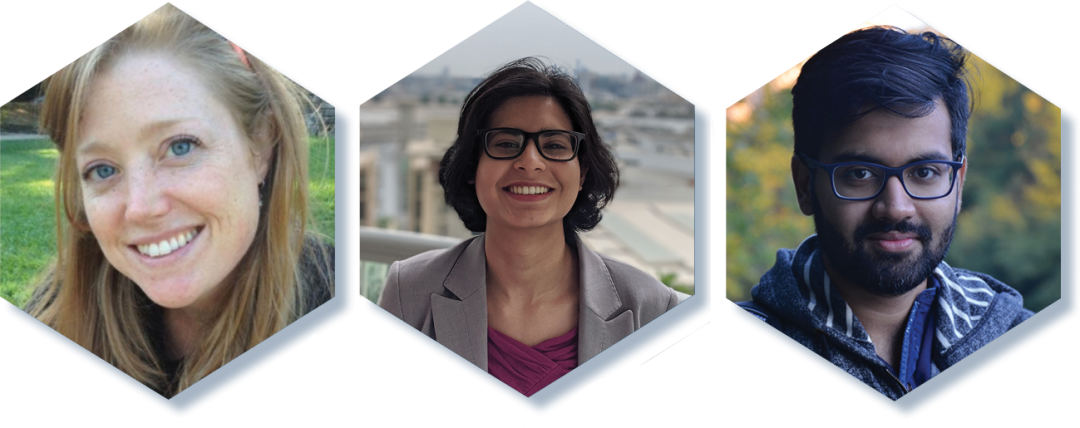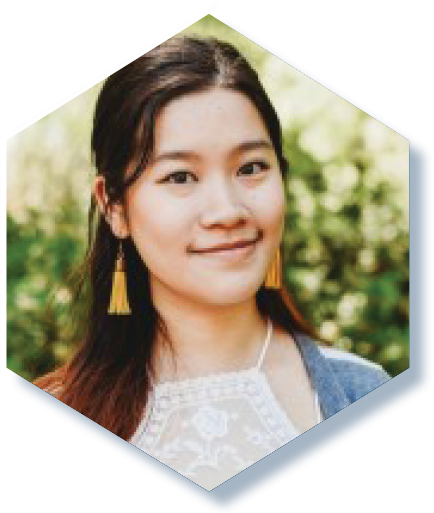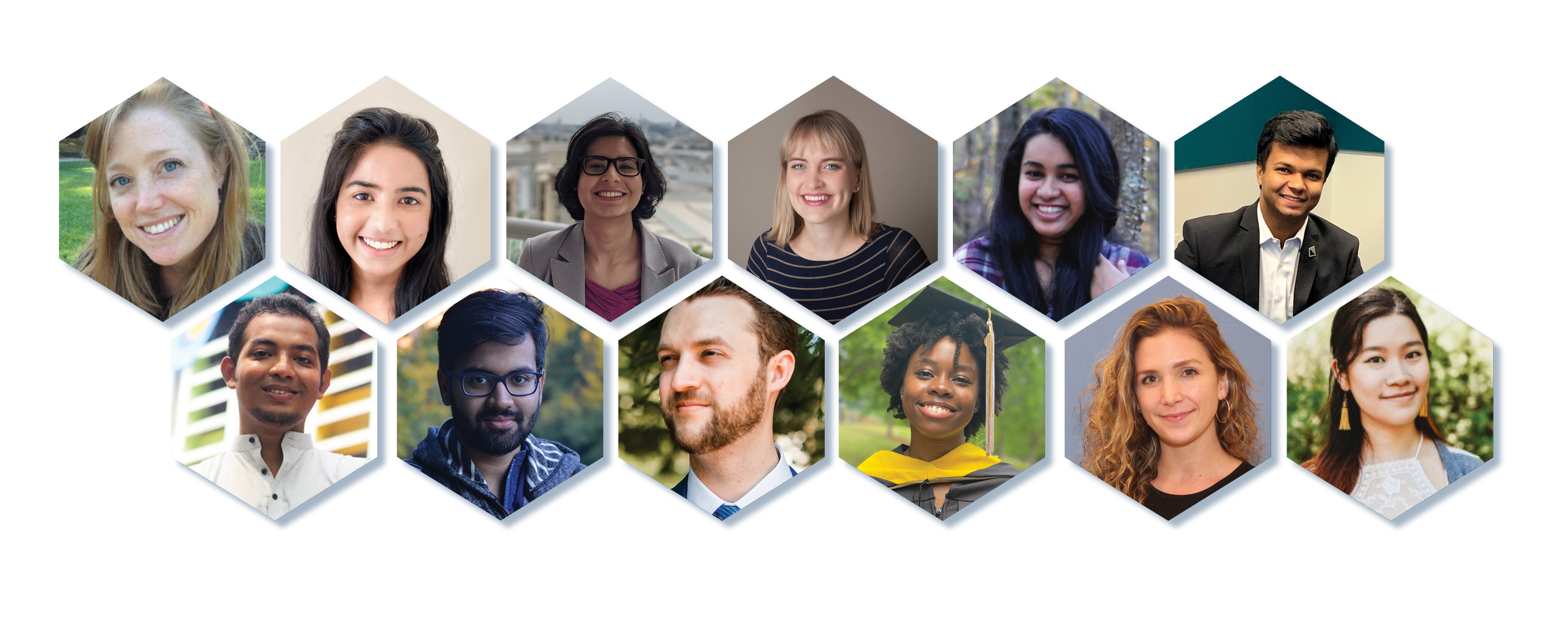Interdisciplinary research is part of the culture of the GVU Center. Ranging from creating cutting-edge computing innovations, to understanding the impacts that these innovations will have on our lives, the students in GVU represent the future of technology.
The GVU Center recognizes top Ph.D. and master's students at Georgia Tech through the annual GVU Graduate Student Awards Program, funded by the James D. Foley GVU Center Endowment.
Each of the 2020 finalists for the program’s two award levels—the Foley Scholarship for Ph.D. students and the GVU Distinguished Master’s Student Award—are involved in research to advance computing technology for the improvement of our daily lives. The GVU Graduate Student Awards Program is the center's highest recognition for student excellence in research contributions to computing.
Learn more below about the four award winners and eight finalists in this year's program.
Picture above (l to r, top to bottom): Ceara Byrne, Sindhu Kiranmai Ernala, Azra Ismail, Duri Long, Nandita Gupta, Varnit Jain, Mehrab Bin Morshed, Koustuv Saha, Daniel Schiff, Ruth Petit-Bois, Shelby Reilly, and Georgianna Lin.
IN THEIR OWN WORDS
GVU’s best and brightest share how they are changing the world
FOLEY SCHOLARS

Ceara Byrne, Azra Ismail, and Koustuv Saha
Ceara Byrne, Computer Science (advisors Melody Jackson and Thad Starner)
In the Animal Computer Interaction (ACI) lab, I create and study technologies that improve communication between working dogs, like service dogs, and their handlers. In particular, my research focuses on improving the outcomes of service dog training. Not all dogs that go into service dog training as puppies have the temperament to become successful assistance animals. However, it is very difficult to determine if a dog has a temperament suitable for a service animal early on in life. That is where my research comes in. In my work, I investigate how aspects of canine temperament can be detected from interactions with sensors, often placed inside of dog toys that I design and build. After running tests where dogs interact with these sensors, I develop models that use sensor data to predict the success of assistance dogs in advanced training.
Azra Ismail, Human-Centered Computing (advisor Neha Kumar)
I am the co-founder of MakerGhat, a non-profit based in Mumbai that creates safe and open makerspaces to support communities in realizing their ideas for local social, economic, and political change. Broadly, my work at Georgia Tech examines and targets social justice issues around healthcare and digital technology in the Global South. My experiences at Georgia Tech and MakerGhat have repeatedly shown me that the best people to address challenges for communities are the ones who are from these communities. I see my role as a facilitator who can foster conversations, resources, and connections, to challenge and reconfigure power structures that determine who has access and voice in the health and technology spaces (typically less for women, rural, and historically marginalized groups). As part of my research, I collaborate closely with communities to identify places for design and technology to support their existing efforts to address local challenges. I have found prior research by faculty and students at GVU to be illuminating in this regard. Their engagement with communities in Atlanta and beyond serves as an inspiration, and I am similarly fostering community ties in Delhi (India), where my research is situated.
Koustuv Saha, Computer Science (advisor Munmun De Choudhury)
My research leverages social media data that reflect online analog of offline (physically co-located) situated communities. Human behavior and wellbeing dynamics are influenced by several intrinsic and extrinsic factors in both normalcy and crisis. To make conclusive research claims from social media data, I adopt causal-inference and computational approaches drawing on machine learning, natural language analysis, and statistical modeling. Causal methods minimize the confounding factors and lead to stronger claims about cause-and-effect relationships regarding people’s reactions to certain events or environments. For example, to understand the effects of campus gun-violence events on student stress, I minimized confounds, such as stress attributable to academic, personal, relationship, environmental, and other factors in college students’ lives. Also, I propose methodologies to address some of the major challenges of social media data, such as the lack of ground-truth and the lack of social media presence altogether. For this purpose, I augment social media with multimodal data such as EMAs and passive sensing streams.
FOLEY SCHOLAR FINALISTS
Sindhu Kiranmai Ernala, Computer Science (advisor Munmun De Choudhury)
One current research project that exemplifies my research vision is the analysis of mental health status transitions as exhibited on social media. Both social relationships and clinical care are required to improve the overall well-being of those with mental illnesses. However, current delivery of care and computational approaches to study mental health are focused either on treatment of the illness (viewing the human as a patient) or support and management of the condition (viewing the human as a support seeker). The goal of this project is to computationally study the intersection of clinical and social pathways of care for mental health.
Duri Long, Human-Centered Computing (advisor Brian Magerko)
My ongoing dissertation work aims to broaden AI literacy by exploring how to design exhibits where family groups can learn about AI in informal learning spaces. I draw on design features that have been shown to aid in quickly engaging museum visitors in active learning experiences—including embodied interaction, creative engagement, and collaboration—that I have explored and tested in my prior research on designing and evaluating public-facing installations. I also draw on a deep understanding of AI technologies that I have developed in my prior research on co-creative AI systems.
Mehrab Bin Morshed, Computer Science (advisors Gregory Abowd and Thomas Ploetz)
My research lies in the intersection of human-computer interaction, ubiquitous computing, and applied machine learning. My research goal is to leverage and expand the sensing capabilities of widely used technologies to assess well-being. One of my current research that aligns with my agenda is related to food insecurities of college students. Food insecurity refers to the idea of not being able to afford food (or healthy food) for mainly monetary reasons. I have designed a study that looks into the severity of food insecurity on a weekly level. I will also investigate how it affects the wellbeing (e.g., mental, physical, and academic) of college students. In addition, I will develop computational methods to measure levels of food insecurity passively in college students.
Daniel Schiff, Public Policy (advisor Ellen Zegura)
My research focuses on the social and policy implications of artificial intelligence. I am generally interested in social policy issues (education, health, labor), the ethics of AI, governance of AI, and science and technology policy. My work is mixed methods in nature and draws on literature in the social sciences and computing. My recent research involves an empirical study of more than 100 public sector, private sector, and non-governmental organizations that have published normative AI ethics documents (i.e., codes, frameworks, guidelines, policy strategies). Our ongoing study addresses the ethics and policy issues in these emerging documents through coding of approximately 25 ethics topics and 17 policy sectors, resulting in an original data set.
GVU DISTINGUISHED MASTER'S STUDENT

Georgianna Lin
Georgianna Lin, Computer Science (advisor Thad Starner)
My current research is in head-worn displays (HWD) and how to improve their experiences in everyday life from alternating tasks like order picking to aiding those who are deaf/Deaf or hard-of-hearing. Specifically, I have studied the most optimal positioning of HWD interfaces and compared different industrial HWD for order picking, compared HWD vs mobile captioning preferences, and examined name-awareness on HWD during real-time captioning. I led two teams from project idea inception to paper submission for both order picking projects and offered guidance and ran experiments for the first captioning project before co-leading the second captioning project.
GVU DISTINGUISHED MASTER'S STUDENT FINALISTS
Nandita Gupta, Human-Computer Interaction (advisor Carrie Bruce)
My Master's Research project is focused on investigating accessibility and inclusion practices followed by Software Developers, UX Researchers, Designers, and Product Managers in different organizations. It intends to bring together different voices of people who work on accessibility initiatives in varied roles and will incorporate storytelling to highlight their work in different areas to inspire others to get involved within accessibility. I have worked on the Zoo Atlanta Project as a UX Researcher to enhance the zoo experience for people with vision impairments. Also, through the Aware Home and in conjunction with Tools for Life, I was part of a participatory design workshop to introduce design thinking and inclusive design at
the Assistive Technology Industry Association Conference 2020.
Varnit Jain, Human-Computer Interaction (advisor Rosa Arriaga)
I have been a part of the Ubicomp Group at GVU Since my first week at Georgia Tech about 10 months ago. I have been working with Dr. Rosa Arriaga to augment Post Traumatic Stress Disorder therapy using data-driven approaches. We will apply our data-driven approach with U.S. military veterans with PTSD. My research consists of user Experience and Development. During the first phase of research, my focus was on creating a context-aware sensing platform to help PTSD patients perform homework tasks while engaged in Prolonged Exposure (PE) therapy.
Ruth Petit-Bois, Computer Science (advisor Ashok Goel)
I am a member of the Design and Intelligence Lab (DILab) and have worked with the group since the Spring of 2019. The specific project I contributed to was the Intelligent Biologically Inspired Design (IBID) project. IBID is an interactive AI research assistant that helps scientists locate and compare articles relevant to their queries. The application makes use of several ontologies (a way to represent concepts and their relationships) that are specific to the structure, behavior, and function (actions) of biological processes or organisms. This project exemplifies my personal research vision because I have always wanted to work on software that simplifies difficult tasks for users.
Shelby Reilly, Human-Computer Interaction (advisor Bruce Walker)
A recent 2019 Report by PERF (Police Executive Research Foundation) showed that more officers died last year by suicide than in the line of duty. This statistic and similar findings drove my research with my partner on the crisis concerning Law Enforcement Officer’s Mental Health. As HCI students interested in mental health, we hoped to uncover the human components involved in this issue and to create a technical system that would combat this crisis. Our first research goal was to focus on uncovering more information about our user group (Law Enforcement Officers) including their day to day tasks, stressors, social network, and environment. During this phase, I scoured online forums, videos, and officer stories and
took notes on all information that was relevant to our research questions. Then we began to research existing systems on preventing mental health problems in order to gain an understanding of the problem space and current options available.




